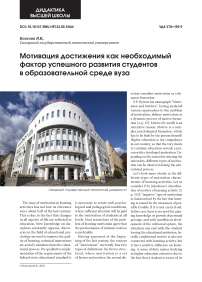Achievement motivation as a necessary factor of students’ successful development in the educational environment of higher education institution (in English)
Автор: Vlasova I.V.
Журнал: Высшее образование сегодня @hetoday
Рубрика: Дидактика высшей школы
Статья в выпуске: 5, 2023 года.
Бесплатный доступ
The question of motivation of university students as a psychological and pedagogical problem is considered, various types of motivation characteristic of educational activities in a university, some classifications of motives for educational activities of domestic and foreign scientists are given. It is concluded that the issue of increasing the level of motivation of students in a higher educational institution should be given close attention, since modern society needs specialists with a high level of professionalism, entrepreneurship, initiative, creativity and creative abilities. For successful development in the educational environment of the university, achievement motivation, a purposeful pursuit of knowledge, complemented by responsibility for one’s own development, adequate self-esteem and assessment of one’s capabilities are important.
Achievement motivation, cognitive motives, learning activities, educational environment of the university
Короткий адрес: https://sciup.org/148327811
IDR: 148327811 | УДК: 378+159.9 | DOI: 10.18137/RNU.HET.23.05.P.044
Текст научной статьи Achievement motivation as a necessary factor of students’ successful development in the educational environment of higher education institution (in English)
Самарский государственный технический университет
Мотивация достижения как необходимый фактор успешного развития студентов в образовательной среде вуза
Самарский государственный технический университет
The issue of motivation in learning activities has not lost its relevance since about half of the last century This is due to the fact that changes in all aspects of life are reflected in education. New knowledge on disciplines constantly appears, discoveries in the field of educational psychology are used to improve the quality of learning, technical innovations are actively introduced into the educational process. For qualitative implementation of the requirements of the federal state educational standard it is necessary to create such psychological and pedagogical conditions, where sufficient attention will be paid to the motivation of students at all levels. Most researchers of the problem of learning motivation agree that the predominance of intrinsic motives is preferable.
Having appeared at the beginning of the last century, the concept of “motivation” currently has two types of definitions: the first is struc-tural,where motivation is a set of factors and motives; the second dir- ection considers motivation as a dynamic formation.
E. . Ilyin in his monograph “Motivation and Motives”, having analyzed various approaches to the problem of motivation, defines motivation as a dynamic process of motive formation [4, p. 67]. Motive (fr. motif) is an incentive reason. Motive is a complex psychological formation, which has to be built by the person himself Higher education is not compulsory in our country, so that the very desire to continue education reveals a person with a developed motivation. Depending on the reason for entering the university, different types of motivation can be observed during the educational process.
Let’s look more closely at the different types of motivation characteristic of learning activities. Let us consider .M. Jakobson’s classification of motives of learning activity [9, p. 2 3]: “negative” type of motivation is characterized by the fact that learning is caused by the awareness of possible trouble if it is not carried out In this case there is no need for gaining knowledge or growth of personal prestige, and with insufficient development of the volitional sphere, the situation can end with the student leaving the educational institution. Socially conditioned motive is also not connected with learning activity, but it has a positive influence on learning. A sense of duty makes studying in higher education attractive due to the fact that a student is aware of its
МОТИВАЦИЯ ДОСТИЖЕНИЯ КАК НЕОБХОДИМЫЙ ФАКТОР УСПЕШНОГО РАЗВИТИЯ СТУДЕНТОВ В ОБРАЗОВАТЕЛЬНОЙ СРЕДЕ ВУЗА

ВЛАСОВА ИРИНА ВЛАДИМИРОВНА
Российская Федерация, город Самара
IRINA V. VLASOVA
Samara, Russian Federation
importance for the chosen profession. It is characterized by greater assiduity, patience and responsibility. This is the best option, when the student enjoys the acquired knowledge. Learning activity really combines many motives of different orientation, in addition, due to its length in time, different motives can replace each other, changing roles and status
Accepting the thesis about poly-motivation of learning activity, it is necessary to allocate what motives act in this activity and how they interact with each other. According to A.N. Leontiev, learning activity is characterized by a combination of cognitive and social motivation [5]. L.I. Bozhovich writes that a mark as a motive of learning activity embodies many needs at once – not only a need for cognition, but also fear of being rejected by relatives or fellow students in case of a bad mark, prestige of good grades and many others. Based on numerous researches, L.I. Bozhovich has developed her own classification of motives of learning L.I. Bozhovich allocates two groups of motives: the first – directly connected with process of learning, generated by educational activity itself, the second group of motives is outside of educational process, is generated by “all system of the relations existing between a person and surrounding reality”[ , p. 65].
Thus, there are motives related to the content of learning, to the process, broad social motives (duty and responsibility, self-determination) and narrow personal motives (to be among the first, good marks, avoiding punishment). As students’ actions contain both social and personal motives, it makes sense to talk about the varying degree of influence of specific motives at a particular moment Thus, the received system not only allocates the basic motives of learning, but also underlines their dynamism. L.I. Bozhovich writes that according to the research, both categories of motives, cognitive and social, are present in any human activity, both educational or not. She emphasizes that not only the presence of a certain motive is important, but also its content.
A.K. Markova develops L.I. Bozhovich’s classification of motives of educational activity. She allocates educational and cognitive motives when there is an orientation of students to mastering of new ways of acquisition of knowledge, interest in methods of scientific knowledge, to ways of self-regulation at performance of work, independent acquisition of knowledge. Motives of self-education – the desire of students to independently improvethe ways of acquiring knowledge. On the basis of these levels of cognitive motives, according to A.K. Markova, achievement motivation can be developed as a desire to achieve a greater success. Formation and development of cognitive motives occurs through mastering by the student “the ways of his activity to acquire new knowledge” [6, p. 05].
A major specialist in the psychology of achievement motivation is the German psychologist H. Heckhausen According to his theory, achievement motivation is always aimed at a certain result (goal) – achieving success or avoiding failure. Achievement of the goal implies a clear sequence of actions. If the result of an activity can be achieved after a considerable period of time,for example, in the case of university studies, there is a constant revision of goals necessary to organize a chain of actions.
According to Gordeeva T.O., achievement motivation is characterized by striving for the best possible performance of an activity aimed at a specific result, to which a success criterion can be applied [3]. The criterion of success implies some standards of evaluation and the possibility of comparison with other results [2, p. 8]. Basically, achievement motiva- tion is characteristic for educational, sports, professional activity and is not characteristic for interpersonal relations. Learning activity is achievement-based: it is aimed at a specific result. H. Heckhausen’s work “ sy-chology of achievement motivation” presents the results of various studies where it is shown that students motivated for success learn better at school and university, are more active in searching for new information, and prefer to bear personal responsibility for the performed activity. Students with predominant achievement motivation are characterized by the importance of adequate feedback, they prefer to choose goals with an average probability of success, where the result will depend on their abilities [7] H. Heckhausen also notes the relationship between intelligence and motivation: highly motivated students are characterized by intelligence growth during age periods, when low-motivated learners experience stagnation [8; 0]. E. . Ilyin notes that the motivation factor for successful learning is more important than the factor of intelligence [4, p. 268]. rofessional, cognitive and general social motives prevail for well performing students
So, based on the above-mentioned research material on the influence of motivation on learning activity in higher education institution, it is necessary to conclude that learning activity is polymotivated, it has a complex hierarchical structure and is characterized by dynamism. It is based on cognitive need, which is natural for every student and transforms into research activity with time. This transformation occurs when a student is in a favorable environment. The desire for creativity and exploratory activity is natural for humans. Learning motivation in higher education is established much earlier, but the factors influencing it are encountered throughout the development of the person. Over time, the motivational sphere becomes more complex, and by the time of studying at the university, in addition to the main cognitive, a number of leading motives appear. Special attention should be paid to the social component of motivation: sense of duty, responsibility, communication with other people, desire to earn their recognition and approval, self-assertion through creative self-realization. The main pedagogical mechanisms are aimed precisely at this area. Achievement motivation is important for successful development in the educational environment of higher education institution – purposeful pursuit of knowledge, supplemented by responsibility for one’s development, adequate self-assessment and evaluation of one’s capabilities.
Список литературы Achievement motivation as a necessary factor of students’ successful development in the educational environment of higher education institution (in English)
- Агарагимова В.К. Подготовка студентов бакалавриата, магистратуры, аспирантуры к осуществлению будущей профессиональной деятельности на основе современных социокультурных реалий. М., 2021. 165 с.
- Айсувакова Т.П. Психолого-педагогические аспекты осуществления образовательного процесса в современных социокультурных условиях. М., 2021. 137 с. EDN: ACFXIV
- Гордеева Т.О., Сычев, О.А. Мотивационные профили как предикторы саморегуляции и академической успешности студентов. // Вестник Московского университета. Серия 14. Психология. 2017. № 1. С. 68-88. EDN: ZHEHWJ
- Ильин Е.П. Мотивация и мотивы. СПб.: Питер, 2011. 512 с. EDN: SDPWVZ
- Леонтьев Д.А., Клейн К.Б. Качество мотивации и качество переживаний как характеристики учебной деятельности // Вестник Московского университета. Серия 14. Психология. 2018. № 4. С. 106-120. EDN: VPZMOX
- Маркова А.К. Мотивация учения в среднем и старшем школьном возрасте. // Вестник практической психологии образования, 2012. № 4 (33). С. 104-106.
- Маркова А.К. Формирование мотивации учения в школьном возрасте: пособие для учителя. М.: Просвещение, 1983. 96 с. EDN: YQCKKS
- Маслоу А. Мотивация и личность. СПб.: Питер, 2017. 400 с.
- Савенков А.И. Педагогическая психология: в 2 ч. М.: Юрайт, 2020. Т. 1. 317 с.
- Хекхаузен Х. Психология мотивации достижения. СПб.: Речь, 2001. 240 с.


